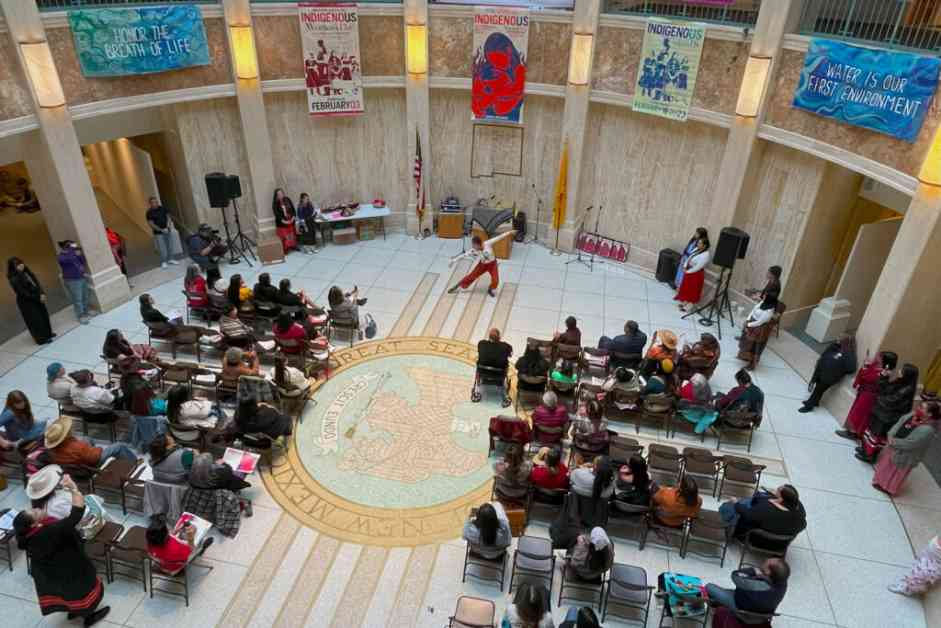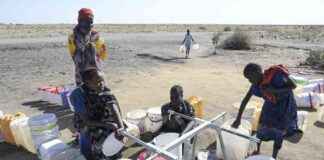Indigenous Women Rally for Climate Crisis Awareness at New Mexico Roundhouse
Santa Fe, New Mexico— In a powerful display of unity and advocacy, Indigenous women, youth, and artists recently gathered at the Roundhouse in New Mexico to shine a spotlight on the pressing issue of climate change. The event, known as Indigenous Women’s Day, marked its fifth year at the New Mexico Capitol, drawing attention to the critical intersections between environmental protection, cultural heritage, and social justice.
The day commenced with a solemn prayer walk to the Roundhouse, a symbolic gesture connecting participants to the land and its significance in their lives. As banners bearing poignant messages like “Water is Our First Environment” and “Honor the Breath of Life” adorned the rotunda, the event unfolded with a reading of the proclamation declaring Saturday as Indigenous Women’s Day. The atmosphere was electric with remarks, dance performances, and musical acts, captivating all in attendance.
Amidst the fervor, Emileah Misty Rain Flower Lujan, a member of Taos Pueblo, shared profound insights on the healing power of returning to the land. Through a mesmerizing hoop dance, she illustrated the intricate connection between Indigenous identity and the natural world. Lujan’s performance served as a poignant reminder of the deep-rooted bonds between culture, tradition, and environmental stewardship.
Julia Bernal, the executive director of Pueblo Action Alliance, shed light on the detrimental impact of resource extraction on Indigenous communities. With a focus on climate and environmental justice, she emphasized the urgent need to address the exploitation of natural resources that perpetuates the climate crisis. Bernal’s impassioned plea for holistic land, water, and air protection underscored the pivotal role of Indigenous women in leading the charge for environmental preservation.
Challenges and Advocacy
Resource extraction activities, such as oil and gas developments in the northwest region of the state, have posed significant challenges to Indigenous communities, particularly near culturally significant areas like Chaco Culture National Historical Park. The alliance’s unwavering stance against the exploitation of natural resources reflects a broader commitment to safeguarding ancestral lands and cultural heritage from environmental degradation.
As the state grapples with the transition towards hydrogen as a zero-emissions energy source, concerns about water consumption in gas production have come to the forefront. The proposed “Strategic Water Supply” initiative by Governor Michelle Lujan Grisham faced scrutiny for its potential environmental impacts, prompting a reevaluation of water usage in energy production. The delicate balance between economic development and environmental conservation remains a contentious issue that demands thoughtful consideration and stakeholder engagement.
Empowering Voices and Driving Change
Jolene Tsinnijinnie, a member of the Pueblo of Santo Domingo and Navajo, highlighted the adverse effects of regulatory rollbacks on environmental protections, warning against the unchecked exploitation of natural resources. Her fervent call to honor the sacred relationship between Indigenous communities and the land echoed a sentiment shared by many advocates seeking to restore the balance between human activities and environmental sustainability.
H.O.P.E. (Honor Our Pueblo Existence), a nonprofit organization based in Santa Clara Pueblo, exemplifies the spirit of environmental activism and cultural preservation. Through advocacy initiatives and community engagement, the organization strives to raise awareness about public health issues stemming from environmental hazards, such as those posed by the Los Alamos National Laboratory. Marian Naranjo, the founder of H.O.P.E., emphasized the importance of meaningful dialogue between tribal governments and regulatory authorities to address environmental concerns effectively.
State Senator Linda Lopez’s visionary leadership in establishing Indigenous Women’s Day serves as a beacon of hope and solidarity for Indigenous communities across New Mexico. By amplifying the voices of Indigenous women and highlighting their unique perspectives on environmental justice, Senator Lopez has fostered a platform for dialogue, collaboration, and advocacy on critical issues affecting tribal lands and resources.
In conclusion, the collective efforts of Indigenous women, activists, and allies underscore the essential role of community-driven initiatives in addressing the multifaceted challenges posed by the climate crisis. As we navigate a rapidly changing world, it is imperative to heed the wisdom of Indigenous voices and honor the sacred bond between people, land, and culture.
—
As we reflect on the profound impact of Indigenous Women’s Day and the ongoing struggle for environmental justice, let us remember that the fight for a sustainable future is a collective endeavor. By supporting organizations like H.O.P.E. and engaging in meaningful dialogue with tribal communities, we can pave the way for a more harmonious relationship with the natural world. Together, we can turn the tide and create a legacy of stewardship and respect for generations to come.














